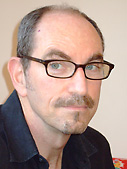Although homosexuality no longer is classified as a mental disorder, HIV prevention research often portrays gay men as suffering from a variety of psychological deficits, according to David Halperin, the W. H. Auden Distinguished University Professor of the History and Theory of Sexuality.
Halperin, whose groundbreaking work in lesbian and gay studies and queer theory has been translated into more than half a dozen languages, will challenge this punitive approach to HIV prevention and discuss the lifesaving creativity of gay men’s sexual cultures in his Distinguished University Professor lecture, “Are Homosexuals Still Sick?” at 4 p.m. Jan. 26 in the Rackham Ampitheatre.

Photo courtesy David Halperin.
Distinguished University Professor is the highest professorial title granted at U-M. A reception will follow the lecture, which is free and open to the public.
“I want to address the way gay men’s sexual risk-taking is characterized in much HIV prevention research,” says Halperin, also a professor of English language and literature, women’s studies and an adjunct professor of classical studies, LSA. “Gay men are portrayed as crawling with pathologies of various sorts (from drug and alcohol abuse to low self-esteem), but that picture is at odds with the ingenuity and resilience that have allowed gay men to survive the epidemic.”
Halperin, also a scholar of ancient Greek literature and philosophy, helped to establish the fields of lesbian and gay studies and queer theory. In addition to co-founding and co-editing “GLQ: A Journal of Lesbian and Gay Studies,” he has written or edited nine books, including “One Hundred Years of Homosexuality and other essays on Greek Love,” “The Lesbian and Gay Studies Reader,” “Saint Foucault,” “What Do Gay Men Want?,” “Gay Shame” (with his U-M colleague Valerie Traub) and the forthcoming “How To Be Gay.”
Gay men are unfairly demonized for spreading HIV and not given credit for the safe sex practices that they pioneered, Halperin says.
“A majority of them remain uninfected despite living in the midst of an epidemic for 30 years,” he says. “People don’t usually expect behavioral change to stop an epidemic, but without a vaccine for HIV that’s all we have.”
Gay men began using condoms to prevent HIV/AIDS in the early 1980s before a sexually transmissible virus was even discovered, Halperin says.
“Public health officials originally discouraged the use of condoms to prevent the spread of HIV/AIDS, because they were not considered completely safe,” he says. “If gay men were given credit for having discovered safe sex it would balance out the image of depressed people engaging in risky behavior.”

